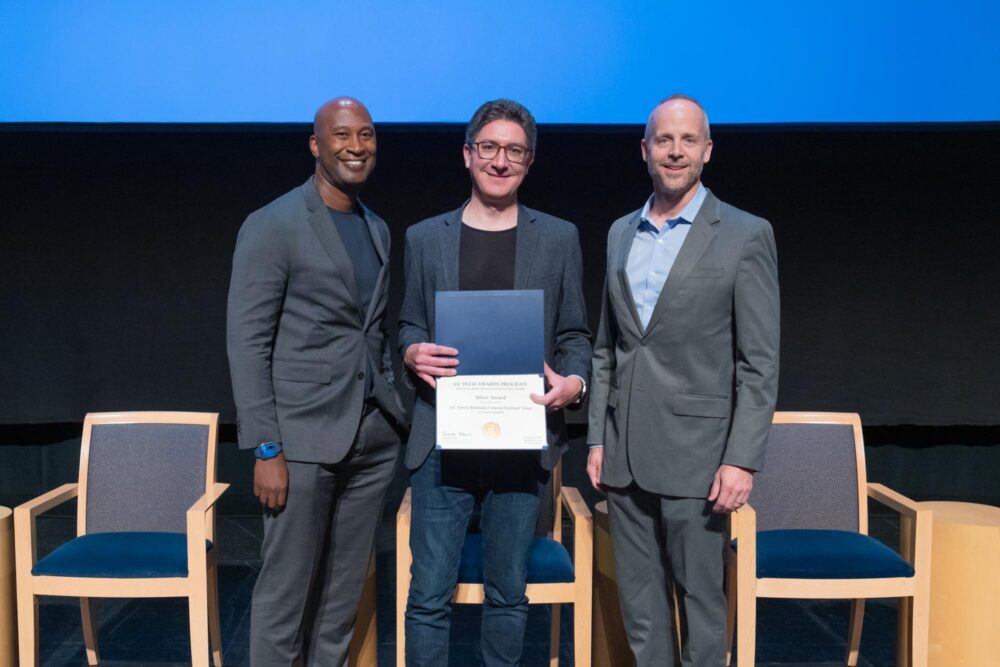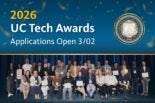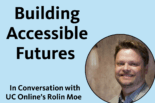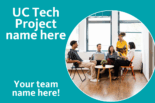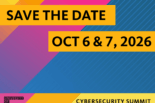The UC Santa Barbara Canvas Implementation Team tied for Silver in the Mojgan Amini Operational Excellence Award at the 2024 UC Tech Awards. This recognition celebrates the team’s achievement in delivering a smooth, campus-wide transition to a new learning management system through a well-planned, two-phase approach, expert technical integration, and strong support for instructors and students — all executed by a small but dedicated core team.
Summary
Following the selection of a new learning management system (LMS) for instruction, the UC Santa Barbara Instructional Support team developed and implemented a phased two-year plan to migrate the campus to a new LMS. The first phase of the project was to implement and customize the new environment and facilitate an easy transition path for all instructors. The second phase of the project specifically aimed to leverage features of the new LMS and hire experts in design and pedagogy to enhance the teaching and learning experience. These outcomes of both phases were measurably successful and were performed by a comparatively (by UC standards) small team. This team is the central support for UCSB’s LMS. The team historically supported the older LMS (Moodle) and were required to simultaneously support both platforms for over a year.
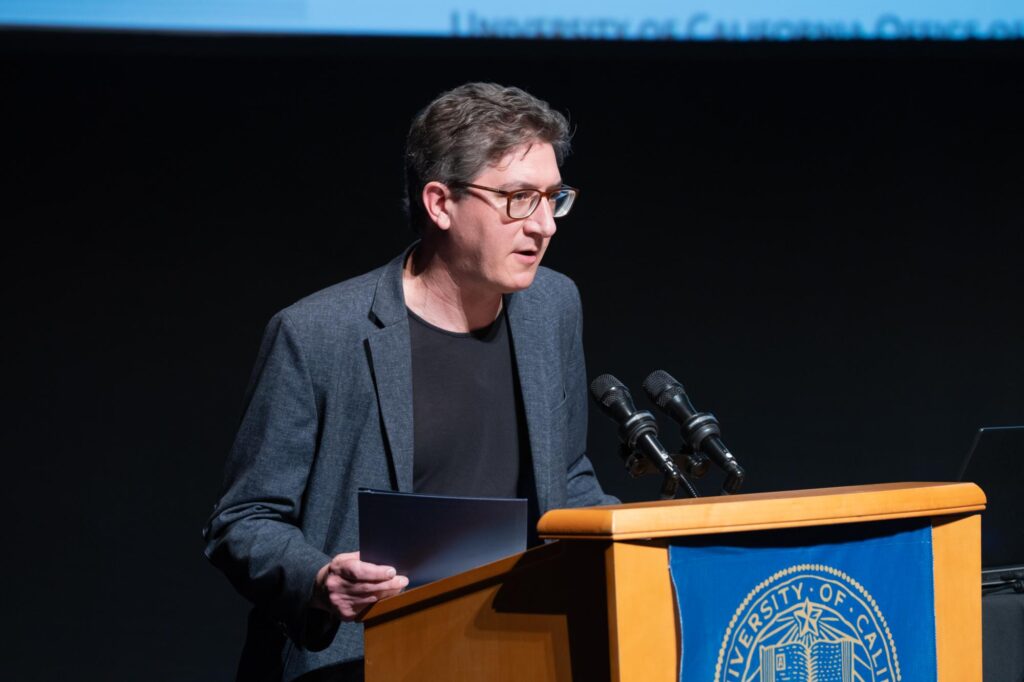
Narrative
Background
Facing the need for a major and almost certainly disruptive software update for our open-source learning management system (LMS), a committee of UCSB instructors and staff was convened to evaluate the future of the LMS during the 2021-22 academic year.
The committee decided that the campus should move to Canvas and completely sunset access to the previous LMS by December 2023. Under this rigid timeline, the Canvas Implementation Team developed and implemented a phased approach to the roll-out of the new LMS.
Phase One – Move to Canvas
In Spring 2022, the team piloted three courses on Canvas, which was expanded to 57 during Summer 2022. During the 2022-2023 academic year, use of Canvas was opt-in for instructors, but encouraged. By Spring 2023, almost half of UCSB courses were using Canvas (over 750).
During Phase One, immense technical effort was required to configure the learning environment’s settings and roles, integrate dozens of external tools, and to define, develop and configure enrollment processes for students, instructors, TAs, and others who support instruction.
Substantial technical effort was required to integrate with the main campus custom/bespoke student information system, and UCSB’s Professional and Continuing Education / Extension unit through a separate enrollment system and a unique authentication method.
The team worked to automate the migration of as much course content as possible from the previous LMS to Canvas, to minimize costly recreation by our instructors. Working with an outside vendor, they migrated 8500 course sites (two years of courses) to the new LMS, without any required instructor involvement.
Additionally, the team developed a sophisticated custom middleware application – UCSB Tools – that integrates with the LMS to allow instructors to provision course shells and to combine the enrollments from multiple courses in a single course site.
Change management
Central to the first phase of the LMS transition were several change management activities. UCSB established an ad-hoc Canvas Steering Committee of faculty, academic and IT leaders, and members of the implementation team–to provide guidance on key decisions and inform other campus leadership. The LMS team developed a communication portal dedicated to the transition to provide information, support, and address FAQs. The team also worked intensely with a vendor to preserve make available recent courses (from the old LMS) automatically in courses on Canvas.
Getting the word out
To ensure widespread campus awareness about the project, the team:
- Held quarterly Canvas Transition Town Halls to field questions from the campus community
- Met with the Academic Senate regularly for project updates
- Provided an overview and progress with key milestone to department chairs
- Communicated with faculty and staff on the transition regularly
- Attended faculty meeting to present updates and answer questions
To support instructors using the new LMS, the team hosted over 100 regular training sessions on basics and advanced functionality in the new LMS and developed help guides and FAQs for using Canvas.
Phase Two – Enhancing the Teaching and Learning Experience
During Summer 2023, the use of the legacy LMS was available on an exception-only basis and by Fall 2023, all courses were using Canvas, 1562 course sites. Canvas course pages are now accessed over 15 million times per month in support of instruction at UCSB.
Recognizing that a new platform used daily by all students for core instructional activity was now successfully in place and instructors were becoming more familiar with it, the team worked to devote additional resources to improving the instructional experience. LSIT hired two one-year contract instructional designers beginning in Summer 2023, the only additional resources leveraged for the project. Their first goal was to create templates that could be used to effectively organize course content in a cohesive way across campus.
Course templates
With feedback from instructors and students, the team created two distinct templates for UCSB Canvas courses to meet differing needs, a “Minimal” Course Template and a “Deluxe” Course Template. Built using the UCSB brand guidelines and following best practices for design and accessibility, both include question banks, allowing instructors to create their own “Getting to Know You Survey” and “Mid-Quarter Feedback Survey.”
The templates also include a UCSB Resources page with helpful links to campus services for class and wellbeing support, designed with colleagues in Student Affairs to maximize visibility for key student services.
The work on templating continued and the team developed alternative versions of these templates with different color schemes and templates for the 6-week summer terms. These templates have been downloaded over 500 times and are in use in classes that support thousands of students.
The LMS team expanded our Canvas training offerings to include Best Practices workshops and created a site devoted to Best Practices, in which the team hosted a number of articles addressing the use of Canvas for different teaching scenarios and modalities, as well as information about our course templates. Specifically targeting large courses and those that are being taught fully online, the team expanded our consultation model and have been able to work directly with over 80 instructors to redesign their courses in Canvas.
Phase 2 technical efforts
The second phase of the project involved additional technical activities. The team was required to develop an archive of over 38,000 course sites to migrate past content into Canvas and to retrieve historical student grades, activity data, and submitted class work. Additionally, our developers have been working to augment some of Canvas’ core functionality, including tools to better handle the bulk uploading of feedback and the development of a photo roster.
Measuring Success: Beyond the numbers
On its face, the project was successful in meeting its goal of migrating the campus to the new LMS by the required deadline. However, a successful transition is best measured through the satisfaction of instructors and students.
Survey data through the project has indicated strong satisfaction with Canvas, with 80% of instructors indicating that getting started with Canvas was easy or somewhat easy. One instructor described it as “Easier to use for students; 2) easier for the instructor; 3) easier to administer quizzes and assignments–in general, a HUGE improvement over the previous LMS.”
Help ticket satisfaction data indicates that the team’s support is tremendously well-received. The Canvas team has a customer satisfaction rating of 99.1% for the 4,903 resolved support requests.
Project Team
- Bret Brinkman — Director of Instructional Technology Services
- Gus Wood — Instructional Applications Operational Expert
- Samantha Schulz — Instructional Applications Support
- MB Kurilko — Canvas LMS Specialist
- Valentina Fahler — Canvas LMS Specialist
- Hector Gonzalez — Instructional Applications Programmer
- Montrell Thigpen — Instructional Applications Programmer
Primary Contact

Executive Director, Letters and Science IT
UC Santa Barbara

